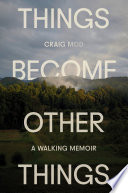
Things Become Other Things
Craig Mod
Craig Mod walks the Kii Peninsula of southern Japan. Along the way, he attempts to make sense of unresolved trauma from the murder of his childhood best friend. Lessons on pilgrimage, the art of walking and observing, japanese culture, rural america, and the archetypes we grow up around.
Date Read: 2025-07-04
Recommendation: 4/5
Notes:
Folks here cultivate a healthy relationship with decay. The right storm could wipe it all clean overnight. And that’s fine, they seem to say, and sometimes outright say it.
I’ve come to crave the solitude and asceticism of these solo walks. There is no quieter place on earth than the third hour of a good long day of walking. It’s alone in this space, this walk-induced hypnosis, that the mind is finally able to receive the strange gifts and charities of the world.
I’ve come to realize the only true walk is the re-walk. You cannot know a place without returning. And even then, once isn’t enough. That’s why I’m back. Back on the Peninsula. Walking these roads I’ve walked before. It’s only through time and distance and effort—concerted, present effort, controlled attention, a gentle and steady gaze upon it all—that you begin to understand old connections, old wounds. That the shape of once-dark paths becomes clear.
There’s a word in Japanese that sums up this feeling better than anything in English: yoyū. A word that somehow means: the excess provided when surrounded by a generous abundance. It can be applied to hearts, wallets, Sunday afternoons, and more.
I find radical honesty about my past to be the quickest way to build intimacy.
The core of the John Effect is deceptively simple. An archetype of speech and being that we lacked: respect mixed with a fervent curiosity colored by a deep and profound emotional intelligence.
I can only walk alone having learned how to walk, how to look at the world with abundant generosity.
A core tenet of a good walk: real-time observation of unfiltered life.
Time passes, life moves, and that’s what happens: Things become… other things.
Two healthy young boys with healthy minds, capable of so much. Our paths ran parallel for so long, until they didn’t. But as we now know, you can start at the same place, under shared circumstance, and in the end it means nothing.
That linguistic gap carried a potential for self-renewal. Move your lips like so and a new self could be built from a fresh set of blocks.
I hold on to the hope that contrition is fixed within the steps of the very walk itself. Each step, an apology. A million apologies.
A camera between the eye and the world is a powerful tool, a suit of armor, a microscope and telescope in one.
From glimpsing that deficit—between myself and this new world I was starting to inhabit—a yawning expanse of emptiness was revealed. The sort of emptiness only revealed when you leave the smallness of your hometown, see the greater world, feel your own void amplified in the abundance of others.
The body acclimates, grows strong. At a certain point on a long walk, the kind of walk where you clock twenty or thirty or forty kilometers a day, day after day—and you get into that rhythm of waking, walking, working, sleeping—you realize that the body is just a machine. You feed it and it turns that feed into steps. The cerebellum does its thing.
I feel certain that I could do this forever—this swinging down and pulling myself up mountains. This moving, this gaining ground. There was no reason to stop, sunset be damned.
To walk like this is the best way I know to show gratitude for the health and privilege authorizing this primitive dance, permitting this day of walking and all other days, too.
Thirty years later and I’m still operating on scarcity, still trying to put in the distance between then and now. As if there would never be enough steps. As if that town could reach out and grab me and pull me back at any moment.